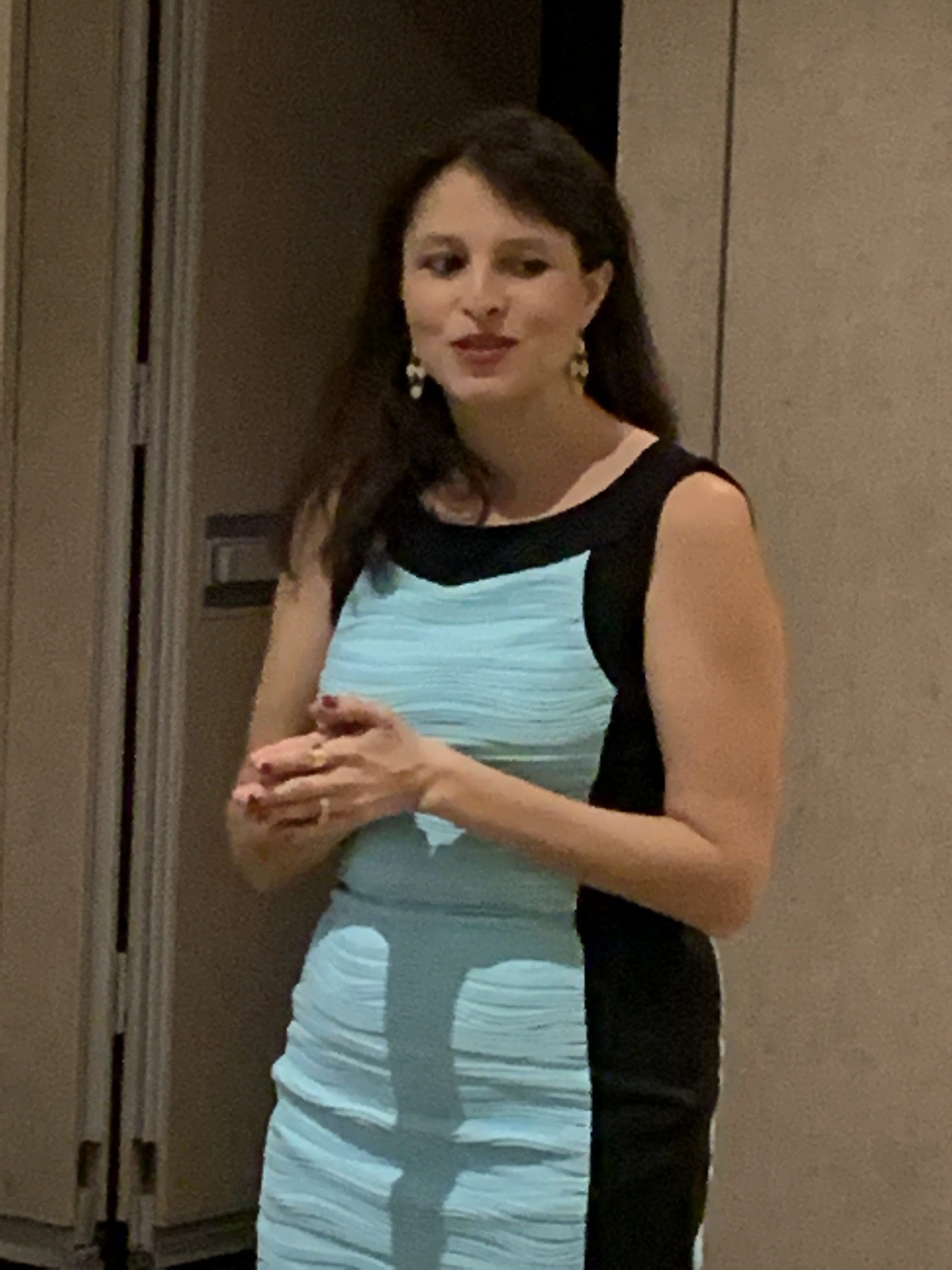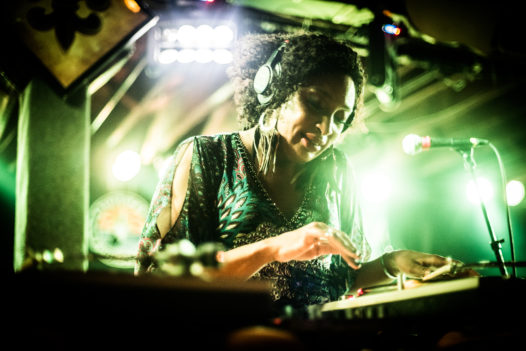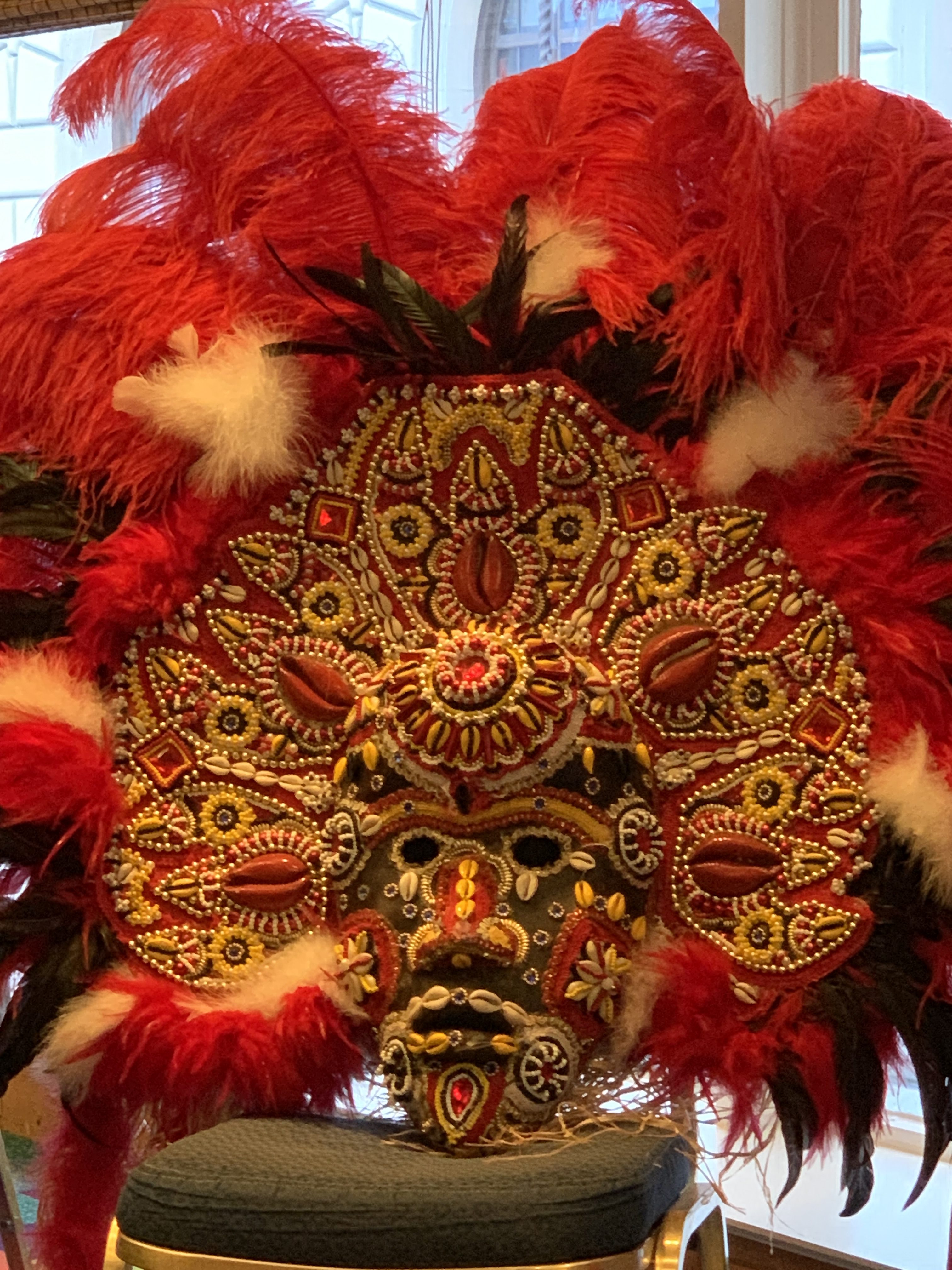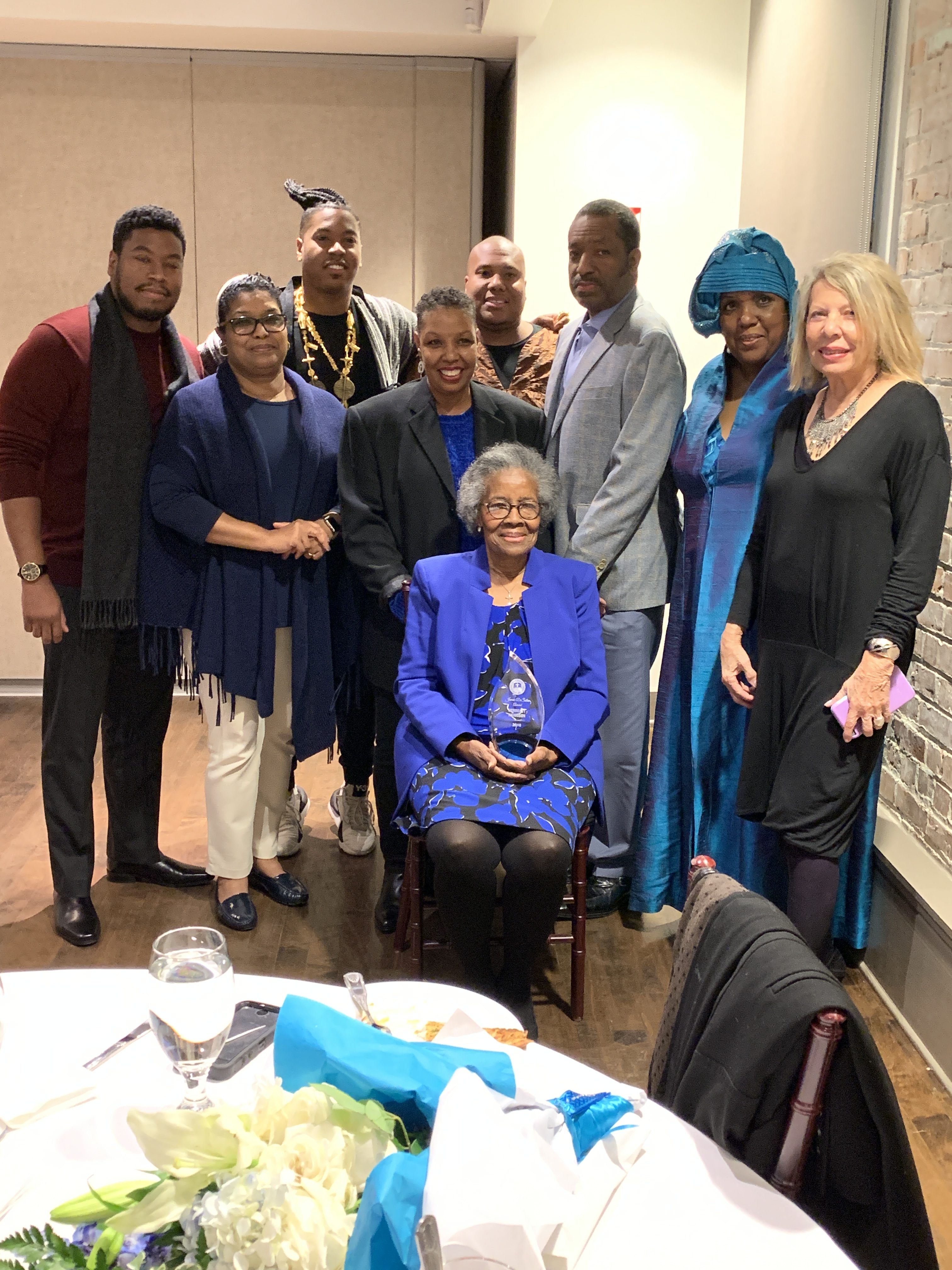
Panelists from Words and Music Conference 2018 (Photo by: Katie Burke)
New Orleans’ Words & Music Conference, now belonging to One Book One New Orleans (“One Book”), took place last month at the Pere Marquette.
Dr. Megan Holt, One Book director and Tulane English professor, directs the event. Rosemary James and Joe DeSalvo, founders of Pirate’s Alley Faulkner Society, transferred Words & Music to One Book and Holt last year.
Holt booked all conference events at only women and minority-owned businesses, and applied all this year’s proceeds directly to literacy resources for New Orleanians. Words & Music also added programming called Black Joy & Justice, curated by writer and documentary filmmaker Kelly Harris-DeBerry, MFA (Creative Writing).
Most panels took place in the Pere Marquette’s Mahalia Jackson Room. According to Holt, having a room named for the Queen of Gospel, a celebrated civil rights activist, clinched the Pere Marquette as the conference venue to replace the Hotel Monteleone.
The conference opened with a panel on radio storytelling, where WYLD-FM’s Hal Clark said he likes that people can’t see him when he hosts Sunday Journal with Hal Clark, his show of sixteen years. Known in his off-radio life as Harold, Clark told his panel audience that after twenty years living in his New Orleans neighborhood, Clark was booking an interview with his neighbor, who said he’d never realized Clark was the radio personality Hal Clark. “And I go to church with this guy and everything,” Clark mused.
Laine Kaplan-Levenson, host and producer of TriPod: New Orleans at 300, told a story about singing a cappella with a flambeaux carrier on St. Charles Avenue during Mardi Gras. She’d been interviewing him to explore any present-day connection with a flambeaux throwers strike in the 1940s. The pair’s spontaneous duet had nothing to do with the story, but Kaplan-Levenson thought it made such great radio that she recorded it and put it on the air.
Next, Robert W. Fieseler and Frank Perez presented on violence against and celebration of New Orleans’ LGBTQ+ community.
Fieseler, author of 2018 book Tinderbox: The Untold Story of the UpStairs Lounge Fire and the Rise of Gay Liberation, told of the 1973 fire at New Orleans’ UpStairs Lounge—the largest anti-LGBTQ+ incident in the country before the 2016 shooting at Orlando’s Pulse Nightclub, and the deadliest New Orleans fire on record, according to Fieseler. Thirty-two people died from fire or smoke inhalation at UpStairs Lounge, Fieseler said.
Fieseler’s use of the word “untold” in his book title, signaling that media coverage of the fire was insufficient, is controversial in some circles. “We know who did the fire, but prejudice allowed it to be covered as a great mystery,” Fieseler explained.

Dr. Megan Holt, One Book director and Tulane English professor who directs Words and Music Conference (Photo by: Katie Burke)
On the topic of the use and evolution of words, Fieseler said the word “twink” for young gay men wasn’t a term in 1973—that it was “chicken,” and that men who liked chickens were “chicken hawks.”
Frank Perez is a historian and writer of three books, including one about New Orleans’ Southern Decadence festival and parade, for which he has served as Grand Marshall. To Fieseler’s comment about chickens and chicken hawks, Perez quipped, “There’s a whole gay zoo.”
Thursday’s lunch took place at New Orleans landmark Dooky Chase, and panelists included legendary Leah Chase. The topic was food traditions passed on in families.
“You don’t have to have an ounce of Black blood in you to be Creole,” Chase said. “When a person comes in and orders gumbo with potato salad on the side, I know he’s a German Creole.”
Chase said people have questioned her inclusive attitude and practices. “People say to me, ‘I don’t understand all these white men who come in (to Dooky Chase).’ I answer, ‘Well, we all gotta eat!’ To make things work, you have to work together. And I think that’s what we do best.”
Isaac Toups, who authored the 2018 Chasing the Gator—Isaac Toups & the New Cajun Cooking, writes about culinary heirlooms to keep them alive, such as his family’s squirrel brain piquante. “That’s about as Cajun as it gets,” he said of the dish, and added that his family regularly placed meats under their house to cool them after boiling them.
Thursday afternoon, writer and visual artist Kristina Kay Robinson taught on bibliomancy, the ancient divination form that includes opening a book to a page, then letting the place where your hand lands tell you something profound.
“Our culture says you read a book and that’s the end. I’m experimenting with all the ways a book can be seen and experienced,” Robinson said.
In the afternoon, Jason Berry—author of the 2018 book City of a Million Dreams: A History of New Orleans at Year 300—presented on a panel with leading New Orleans jazz figure and clarinet player Dr. Michael White, on the origin of jazz funerals and their place in contemporary New Orleans culture.
In his research for the book, Berry discovered that some New Orleanians don’t bury their dead.
One person told Berry his family had a Chinese taxidermist preserve family member Willie Brown upon his death thirty years before, and that they stored him in a house in the Seventh Ward.
Dr. White said younger jazz bands don’t play dirges at funerals anymore, and that families say they don’t want any sad songs at all. Then he pulled out his clarinet and charmed the audience with a solo performance.
“I was Tootie from Facts of Life,” joked iconic New Orleans DJ Melissa Weber, better known as DJ Soul Sister, in an interview panel that night. DJ Soul Sister was referring to her college days volunteering with New Orleans radio station WWOZ, where all the other DJs were much older than she.

DJ Soul Sister spinning records. When not spinning, she is also talking about spinning at the Words and Music Conference (photo by: Avery White)
DJ Soul Sister referred to herself as a “crate digger,” which means a person who “goes into weird spaces in out-of-the-way places” looking for records.
For example: “If you go into someone’s attic, and a spider bites you on the way up.”
A part-time graduate student studying musicology at Tulane, DJ Soul Sister said she wanted to contribute to the research about Black music.
On being in the minority as a female DJ, DJ Soul Sister said, “I never introduce myself as a female DJ. You never hear Grandmaster Flash introduced as a male DJ. But I represent for women all the time.”
“When you put the costume on and go out,” Baby Doll Merline Kimble said in the next morning’s panel, “you become somebody else.”
The topic was New Orleans culture bearers, and the panelists delivered. Photographer Eric Waters’s 2017 book, Freedom’s Dance: Social and Pleasure Clubs in New Orleans, depicts “African retentive” groups in New Orleans and, off the South Carolina, Atlanta, and Florida coasts, the Gullah Geechee.
Waters spoke to white appropriation in New Orleans, citing Tuba Skinny’s receipt of Offbeat Magazine’s Owl Call Blues award after he’d been in New Orleans five years, when Trombone Shorty’s family had been in New Orleans for “decades and generations.”
Regarding the practice of many white people in New Orleans imitating second lines, Waters said, “It’s sinful; it’s what white folks do. They come in, and they want to make it their own.”
To Waters’s comment that all white people are off the beat while dancing, Xavier University’s College of Arts and Sciences associate dean Kim Vaz-Deville said, “It’s not whether or not someone can dance; it’s whether or not Black people can have something … we have so little.”
Big Chief Victor Harris, of the Fi-Ya-Ya tribe, also delivered remarks, though his most striking contribution was his carrying in one of his Mardi Gras masks.

Unmasking the mask at the Words and Music Conference 2018 (Photo by: Katie Burke)
Speaking later that morning to New Orleans’ “in-between spaces,” John Klingman, who holds the Favrot Professorship in Architecture at Tulane, said he integrates the indoors and outdoors in his home, using a ceiling fan, windows, and twenty operable shutters to set the temperature. He also has four fireplaces: two upstairs, two downstairs. With fire, he said, “you get that sense of the room coming more alive.”
At lunch on Friday, poets Alison Pelegrin, James Nolan, Christopher Romaguera, Shaina Monet, Dr. Mona Lisa Saloy, and Clare Harmon read at The Dragonfly, New Orleans’ first poetry-dedicated space, opened two months ago.
Nolan, whose many books include the 2018 Flight Risk: Memoirs of a New Orleans Bad Boy, opened the reading by saying, “For New Orleans people, you know that if you ask us our opinion, we’re not gonna give it. We’re gonna tell you a story or sing you a song.”
Also the writer of a poetry collection about New Orleans called Nasty Water, Nolan added, “In New Orleans, water is the reality and land is the illusion. We’re like a shimmering mirage floating on water. I plan to be buried in a bathing suit and flippers, so I can swim toward the light.”
Shaina Monet read three poems about her ancestors and experience as a Black woman.
Clare Louise Harmon read about her alcoholic father, set to classical music. “The virtuoso abandons what no longer serves him,” was one throwaway line.
Christopher Louis Romaguera read about Cuba and Miami.
Alison Pelegrin read poems about body image, and the relationship between her Catholicism and sexual violations she has endured. “He told me I was lucky to get off with a warning,” she read, of a police officer who had placed one hand on a steering wheel and the other down her shirt while driving her home. “And thinking of St. Maria Goretti with fourteen stab wounds, I suppose he was right.”

Words, music, food, and people all come up for discussion at the Words and Music Conference 2018 (Photo by: Katie Burke)
Dr. Mona Lisa Savoy, who wrote poetry book Red Beans & Ricely Yours, was moving back home to New Orleans that week, after living in multiple other cities since she evacuated for Hurricane Katrina in 2005. “And I’m moving into the house my father built,” she said, nodding to Harmon. “So I’m reading some daddy poems, too.”
Friday afternoon, daughter and father Nicole and Peter Cooley, both poets, spoke of their lives as writers.
Nicole said her dad taught her “not to fetishize the perfect writing space,” but instead to get writing done whenever and wherever possible. She recalled that growing up, she and her dad sometimes stopped at Mr. Donut, “which had bad donuts and even worse coffee,” and sat there pulling words and writing from them.
“Keep the process going,” Peter affirmed. “I think that’s so important, really. I have to be involved in (writing) in some way every day.”
Later Friday, Maurice Carlos Ruffin, whose debut novel We Cast a Shadow releases in 2019, spoke of his journey writing while working a day job. A lawyer, writer, restaurant owner, runner, and husband, Ruffin recommended that writers forge ahead without overthinking.
We Cast a Shadow has a father/son storyline. Ruffin recently lost his dad, whose spirit he said is in the book. “I had a great father,” Ruffin said. “This book in many parts speaks to him.”
The book brings readers into law firm culture. Ruffin himself began practicing law in 2003, in firms of about 300 people, only five or ten of whom were Black lawyers. The microaggressions in his book were stories he has “heard about or told” in his career.
“Maybe this book is one more lens into what’s been going on for the entire history of our country,” he added. “If you look back, you’ll see that five or six years ago, some of your friends were telling you this was happening.” But since 2016, Ruffin says, everyone is aware of what he’s always known.
“As a Black person, you see things like Sandra Bland, and you know that’s going to be part of your life, but it’s not your entire life,” he said.
Friday night, conference attendees gathered at Cafe Reconcile for “Night in Blue,” an event honoring Mrs. Herreast Harrison for donating over 35,000 books to New Orleans children. Guests wore Harrison’s favorite color, blue, and dined on catering from Neyow’s Creole Cafe, her favorite restaurant. Harrison received the James-DeSalvo award, which Rosemary James and Joe DeSalvo established last year to reward recipients for promoting literacy in New Orleans.
Saturday morning, Johnnie Bernhard, author of books including the 2018 How We Came to Be, taught query letter writing.
“Do not use the sentence ‘This would make a great movie,’” Bernhard advised. She added that the body paragraph of the query letter should show that the book will have conflict.
“This isn’t where, gosh, everybody’s white and middle-aged, and everything’s zippity-doo-dah in Clinton, Mississippi,” she said. On finding the right community of writers, Bernhard warned, “If the bubble you’re in is not helping you grow as a person and as a writer, get out. If you stay in a bubble like that, you’ll become your biggest fan.”
Later that morning, students involved with 826 NOLA read their poetry and prose about being gay and trans, about mental illness, and about bullying.
Lunch on Saturday featured Black New Orleans journalists presenting a panel on race in the media.
Jarvis DeBerry, editorial writer and columnist for The Times Picayune, is conscious of race continuing to be a factor in how people consume news. He told a story of a Times Picayune reader once attacking an argument DeBerry had purportedly made, except DeBerry hadn’t been the one to make it.
“I often wonder how people would react if I removed my picture or my name from an article … because I know my mere face is triggering to some people,” DeBerry said, adding, “A lot of people aren’t troubled by my argument; they’re troubled by my presence.”
Advertising also presents a unique challenge to Black journalists. “(Black people) are ignorant; we are poor; we are criminals. And (companies) don’t want to advertise for ‘those people’ to come into (their) business,” WBOK 1230AM Station Manager Susan Henry explained.
Henry recounted an incident in which WBOK reported that people in East New Orleans didn’t want Entergy in their community. Complaining that WBOK was broadcasting the opposition too much, an Entergy executive stopped its $20,000.00 advertising check to WBOK without notice.
After lunch, Kelly Harris-DeBerry showed her documentary film on New Orleans, Black Love as a Sustaining Force Post-Katrina. Following the film, Harris-DeBerry explained why New Orleans is so special to her. “I could have better schools for my daughter,” Harris-DeBerry said. “But it’s the love that keeps me in New Orleans.”
Loretta Harrison, owner of Loretta’s Authentic Pralines, was an example. Once, when Harrison heard Harris-DeBerry was sick, she made “healing soup” for her and had people come into the store and pray over the pot.
Saturday afternoon, Greer Mendy, a lawyer who founded the Tekrema Center for Art and Culture, educated the conference guests on the history of dance in New Orleans. Bounce came from Uptown, Mendy said. “Bounce says, ‘You’re letting the developments go to hell; you’re letting education go to hell. Mayor Landrieu, or whoever, kiss our ass.’”
Later that afternoon, winners and runners-up from the Words & Music Writing Competition read their work. Claire Jentsch, the runner-up in short stories, read about Thanksgiving. Lana Austin was the poetry winner, and Kelly Anderson was the runner-up.
Jesus Mendez, who is incarcerated in New Mexico, was the runner-up and winner in the Beyond the Bars category for people in prison. Raven Little won in the short story category of a child writing competition, for which only public school children could enter.
All winners and runners-up will be published in the July 2019 issue of Peauxdunque Review.
In the early evening, panelists Johnnie Bernhard, David Armand, and Jack Bedell extolled the virtues of university presses for publication. Bedell, Southeastern Louisiana University professor and author of No Brother, This Storm, remarked that being well-funded, university presses don’t have to worry about distribution and marketing, and thus “they have more time to care about paper quality and live editing.” By comparison, he said, Penguin changed “bayou” to “canal” in one author’s book because the publisher didn’t take know or bother to understand the difference between the two.

Panel discussions at the Words and Music Conference 2018 (Photo by: Katie Burke)
University presses don’t do all the heavy lifting for authors, however. Armand, Writer-in-Residence at Southeastern Louisiana University, pointed out that all writers must promote their own books. He said he’d recently seen Stephen King doing so on Twitter. “And he can print out his grocery list and people are gonna buy it,” Armand added.
Saturday night, Whiskey and Sticks hosted a poetry open mic honoring Aretha Franklin, where all in attendance were invited to read or speak their poetry.
Sunday morning, a panel of authors who’d each had a book released within four months of the conference discussed writing.
Zell, a crime writer who just published City Krystal Soulman, said he often constructs a plot, then sees a story just like it on the news. He sets all of his books in New Orleans, each at a different time of year, “because New Orleans feels, smells, and looks different at different times of year.”
Next, on a panel about literacy as a tool to combat incarceration, attendees learned that Louisiana is the most incarcerated place per capita in the world.
Local artist and Louisiana Books 2 Prisoners board member Susannah Rosenthal said, “Prisoners often don’t have access to books, unlike what you see on Orange is the New Black.” She explained that privileged access to the library can be taken away, and that incarcerated people often can’t take books with them when they transfer to another facility, and must pay to do so when they can.
The final conference event was lunch at Ashé Cultural Arts Center, where Holt told the crowd New Orleans has a 28% functional illiteracy rate.
Zachary Lazar, panel moderator and author of books including his recently released Vengeance, opened with a story about his friend Deborah, who collaborated with him on a prison project. In the process of working together, he and Deborah discovered that they’d both had a parent killed by two separate contract killings in Phoenix.
Members of The Graduates, a three-year old ensemble comprised of former members of the Louisiana Correctional Institute for Women (“LCIW”) Drama Club, performed for the crowd. Fox Rich, who once faced 297 years in prison for bank robbery, has been out for sixteen years, after accepting a plea deal for two seven-year terms and one five-year term. In 2009, she released a book on Amazon called The One That Got Away.
Rich’s husband, Rob, who participated in the robbery, had been home as of the lunch panel for fifty-nine days. He and Rich, who have four children, recently celebrated thirty-one years as a couple. Twin boys Freedom and Justice are their youngest. Freedom is presently studying at Loyola on a full scholarship, and both work on the family business.
Rich told the audience that statistically speaking, all the women in Louisiana have a five to ten percent chance of becoming incarcerated; and that if you’re a convicted felon in Louisiana, there are 400 professional licenses you can’t hold once you’re on the outside.
With its intentional focus on social justice and diversity, Words & Music has turned a new corner in its first year under One Book. Conference regulars will be interested to see how this inclusive culture expands in years to come.
Katie Burke is a writer and family law attorney, who lives in San Francisco. She visits New Orleans annually to write, volunteer, visit friends, and dance to our world class brass music. Her encounters with New Orleans’ fascinating characters gives her a unique view into the soul of our city.
 NOLAbeings
Multimedia artist Claire Bangser created NOLAbeings as a portrait-based story project that marries...
NOLAbeings
Multimedia artist Claire Bangser created NOLAbeings as a portrait-based story project that marries...
 Data corner: Adobe Suite (create a PDF, social media graphic, presentation, edit a photo and video
Data corner is where you go to work with analytics and top tech skills. It takes on everything from PERL and SQL to Canva and Sprout Social.
Data corner: Adobe Suite (create a PDF, social media graphic, presentation, edit a photo and video
Data corner is where you go to work with analytics and top tech skills. It takes on everything from PERL and SQL to Canva and Sprout Social.
